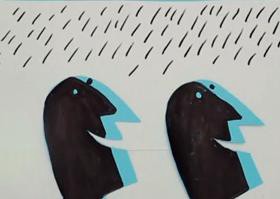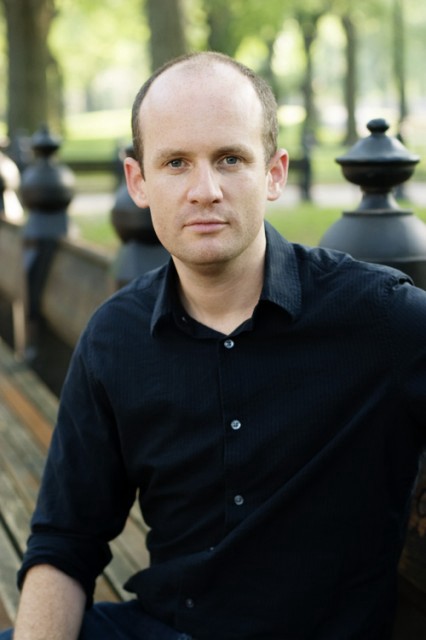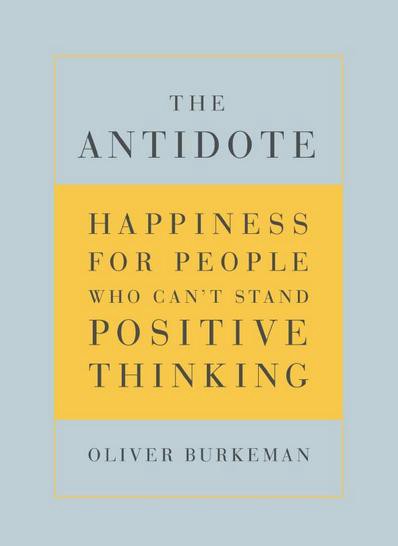Oliver Burkeman and the Pursuit of Happiness

Guardian writer Oliver Burkeman’s book The Antidote: Happiness for People Who Can’t Stand Positive Thinking comes out today in the U.S. The brief and Burkeman-narrated trailer above gives a quick idea of what it’s about — essentially, how to be happier without worrying about being happier. Burkeman was kind enough to answer a few questions about the book via email, and to make an unexpected Aqua reference.
Edith Zimmerman: Oliver, thank you for emailing with me! I’ll jump right into it. Wanting to be “happy” seems like such a catch-all idea, and a seemingly impossible thing to aim for, especially when the more you zoom in on what it means — or what an individual means by it — the vaguer it seems. (Personally I picture like a smiley face gliding around a house.) What would be a more specific, realistic thing for people to aim for instead? More-frequent moments of satisfaction? Bravery? Kindness?
Oliver Burkeman: I completely agree about the impossibility and vagueness. I set off to report a book on why “positive thinking” and relentless optimism is a pretty terrible path to happiness, and it is, but I ended up having to concede that “happiness” as a destination is also fairly problematic. I really like the way the psychologist Paul Pearsall put it — that what we need is more “awe,” an emotion that mixes wonder (the positive) and fear (the negative). The things you mention, bravery and kindness, are definitely going to lead to more awe if you pursue them seriously. Needless to say, this is the exact opposite of what’s promised by positive thinking and conventional self-help, which seems aimed more at an unbroken state of excitement. I doubt that’s attainable, and even if it was, you’d just end up annoying everyone else. (And would it even be desirable? I’d rather get to the end of my life feeling like I’d fully experienced the highs and the lows, not that I’d successfully managed to shut out the lows.)
You mention that instead of envisioning positive things, it might be more useful to envision worst-case scenarios. What’s a worst-case scenario you envisioned recently?
I love this technique, which goes back to the Stoics, who called it “the premeditation of evils”: they argued that you’d feel far more appreciative of the advantages you enjoy in life if you reflected on the fact that you might lose them at any moment; you’d cherish your relationships more by remembering that your loved ones might — and eventually will — die. (Seneca the Stoic was ordered to commit ritual suicide by bleeding himself to death, so maybe the fragility of life back then helps explain why they preferred this kind of view over positive thinking.) But it’s also a great antidote to anxiety, even in minor ways. A couple of days ago, getting unduly stressed by a writing deadline, I remembered to stop and think: what’s the *actual* worst that could happen if I mess this up completely? It would be annoying, sure. But before I’d asked myself that, my anxiety was disproportionate, and was getting in the way of work. We seem to go through life racing to catch planes, or worrying about job interviews, or fretting about relationships, as if it would be literally as bad as nuclear war if things didn’t work out.

Do you actually think it’s possible for people to change their lives/outlooks/brains? I guess the answer to this has to be yes. But in case it’s not … off the record? I don’t know. It seems so hard. It almost seems like weight loss books. People love to buy them because it feels like doing something good/proactive, taking the right steps, but then more often than not, nothing actually changes. I guess: To what degree do you believe humans are capable of mental change?
The standard psychological wisdom these days is that it’s 50/10/40: 50% “set point,” determined by your genes, 10% by circumstances — wealth, health, etcetera, and then 40% that’s under your control. (The big surprise there is the 10%: I think most of us imagine circumstances would account for far more.) But the go-to fridge-magnet quote here is from Carl Rogers: “The curious paradox is that when I accept myself just as I am, then I can change.” Positive thinking demands that you change unwelcome thoughts and feelings. Whereas it seems to me that something like Buddhist meditation, and some modern forms of therapy, are focused much more on learning to observe thoughts and feelings without giving in to the urge to try to manipulate them. So that’s the paradox: perhaps the best change you can make is resisting the compulsion to change. As a master procrastinator, the only way I got this book written at all was by realizing I didn’t need to “feel motivated” to do so. You can just feel reluctant and procrastinatory and irritated, but act anyway.
Are you afraid of dying?
Hmmm … I’m definitely afraid of what condition old age and illness might leave me in. Fearing death itself is a much weirder notion — after exploring this, for the book, I came to agree with the thinkers who say it makes no sense to fear a condition you won’t be around to experience. What I got from visiting Mexico during the Day of the Dead, though, and talking to philosophers, is that we’d all be better off becoming more familiar with death in an informal, everyday way, reflecting on it even when circumstances don’t force us to, to make the whole thing less horrifying. There’s a group called Death Cafe that holds death-themed conversations over coffee and cookies. That sounds incredible.

Could “have low expectations in general” be a simplistic summary of your approach?
I don’t think so, actually, though it’s been claimed that some countries, such as Denmark, perform well in happiness surveys because nobody expects too much from life there. For me, having gone on this whole journey, the ideal might be something more like “no expectations”: an openness to whatever happens. Embracing the uncertainty. That doesn’t mean I’m particularly good at this, I should stress. But then being OK with being imperfect is part of the point too, so I have a built-in get-out clause there.
Should children be taught the power of negative thinking in elementary school? (Vs. the current “think positive”/”I can be anything I want” etc. models. Although maybe “I can be anything I want” isn’t necessarily an example of positive thinking. Hmm … )
I think the psychologist Carol Dweck, who’s done lots of fascinating work on how children relate to the experience of failure, would probably say that you should. She also argues that we should praise children for their efforts, not their accomplishments — praising for accomplishment makes kids see their attainments as a bar they’ve got to keep reaching, which dissuades them from pushing themselves for fear of falling short. Unless you learn that negative emotions and experiences are OK, you’re going to dedicate all your energies to avoiding them, and that gets you nowhere, except perhaps to a career as a motivational speaker telling people to walk barefoot across hot coals, or whatever.
How was your week of silence?
It was amazing, but that’s not to say it was fun. This was at the Insight Meditation Society in Barre, Massachusetts, and basically entailed unbroken sitting and walking meditation from about 6 a.m. to 9 p.m. (with some meal breaks and a couple of rest periods). The first thing you realize when you remove all the outer sounds and stimuli is that your mind is relentlessly noisy: for the first day or so I had the appalling 1997 pop song “Barbie Girl,” which I’ve never liked or owned, stuck ceaselessly in my head. And so, if you’re anything like me, you struggle to “get calm” and quieten down, but it doesn’t work, so you feel worse … and then you realize that that’s not the point. The point (if there is one — and lots of Buddhist teachers would object to the idea of a “point,” I think) is to learn to observe your interior world without judgment. And then once you realize that, things do get calmer, of their own accord. From that point on, it was a wonderful experience, until I got back to the everyday world and checked by inbox for the first time in days.
I like what I’ve read about how you enacted your (minor) fears — yelling on a train and sounding nuts; dressing badly, etc. — to see that they’re not actually that bad, and can in fact be liberating. “It happened, I lived, now I don’t have to take up brainspace worrying about that anymore.” I’d be curious to hear more about that, and if you recommend any particular ones to try out.
The train exercise came from Albert Ellis, the fantastically sweary New York psychotherapist who died in 2006. (The reason behind human suffering, he perceptively noted, is that “we’re all out of our fucking minds.”) If you’re easily embarrassed, he argued, you should embarrass yourself deliberately — because then you’ll learn directly that your fears were overblown. So I did this on the London Underground, speaking the names of the stations out loud, as he suggested. It was pretty excruciating, but that’s not the point — the point is that I didn’t get arrested or attacked and my head didn’t explode. A few people looked at me oddly, but most of them were wrapped up in their own worlds, as most people are most of the time. And realizing all that was curiously liberating and exhilirating. If you’re going to choose an exercise like this yourself, the main thing is to pick one that’s legal, considerate of others, and not dangerous. For some people, just striking up a conversation at a party might count. The point is to figure out what you fear, then choreograph a confrontation between those fears and the real experience.
‘The Antidote: Happiness for People Who Can’t Stand Positive Thinking’ is out now. Oliver Burkeman is also on Twitter.